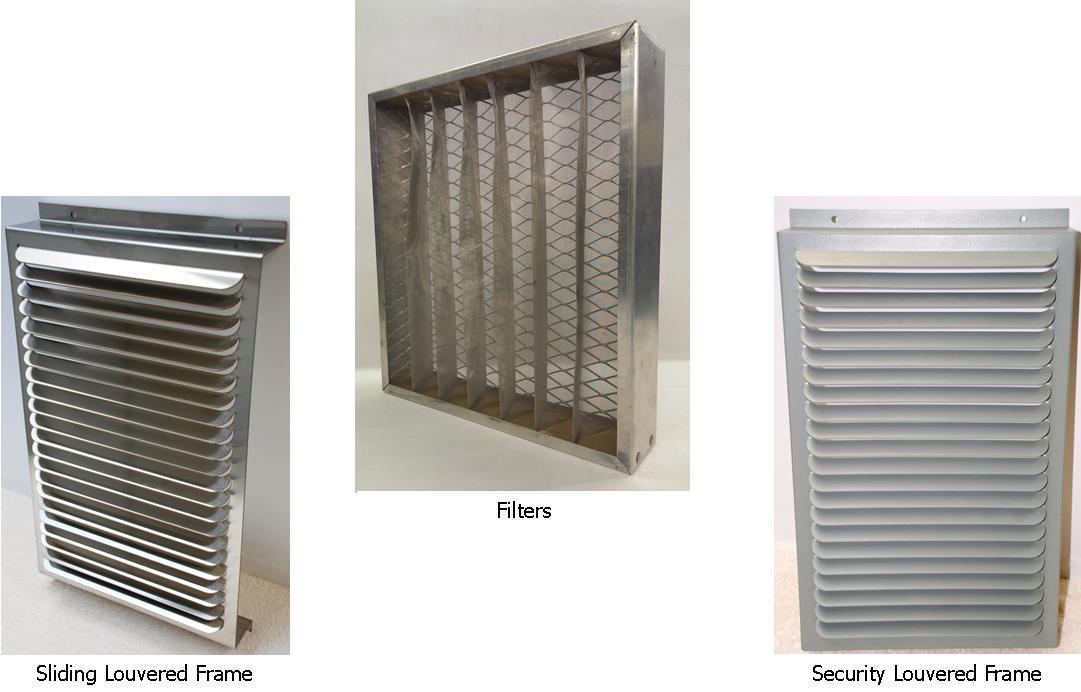How to Determine if Your Enclosure Cooling System Needs New Filters

Filters are an important part of any thermal management system. Whether the enclosure cooling system is comprised of cooling fans or uses an air conditioner, air filters are used to protect motors, drives and electrical components from harsh environmental elements such as dust and dirt.
Filters require cleaning or replacement at regular intervals since clogged filters increase air resistance and will reduce a fan’s cooling capacity resulting in poor enclosure cooling system performance.
To ensure proper operation filters should be inspected, cleaned or replaced periodically.
Enclosure Cooling Fan Filter Inspection and Replacement
Cooling fans draw ambient air from the surrounding environment directly into the enclosure to cool heat producing equipment. Unfiltered air entering the enclosure would allow dust to accumulate on electrical components leading to possible overheating, electrical shorts or premature failure resulting in costly unplanned operation shut downs.
A visual inspection is the easiest method to determine if filter replacement is necessary. Filters which appear covered with a layer of dust or dirt require replacement. If routine filter inspection is neglected or delayed the enclosure cooling system will not perform at its design capacity, potentially causing electrical components to reach temperatures above their safe maximum operating limits.
Enclosure Air Conditioner Maintenance and Filter Replacement
Enclosure air conditioners also require regular visual inspections for filter maintenance. The first indication of an excessively clogged air filter is an increase in temperature inside the electrical enclosure due to the air conditioner operating inefficiently. If electrical components are exposed to excessive operating temperatures too long, malfunctions and damage can occur.
Continued air conditioner operation under these conditions will cause the thermal overload device to turn off the compressor. Once the compressor temperature drops to a safe level the compressor will restart but on-off cycling will continue until the filter is replaced. Long term on-off compressor cycling can potentially cause damage, shortening the life of the compressor.
While conducting a visual inspection of the air conditioner filter to determine if replacement is necessary, it’s also good practice to check both the condenser coil and fan blades to ensure they are dust free, allowing for maximum unrestricted air flow. Additionally, an air conditioner equipped with a remote monitoring system can alert the operator of any cooling system malfunctions.
Air-to-air heat exchangers do not require filters but the the condenser air inlet should be inspected and cleaned if necessary to ensure proper enclosure cooling.
How to Determine Filter Maintenance Intervals
Recommending specific filter cleaning intervals isn’t possible since the type of environment varies widely with each application. After initial enclosure cooling system installation, periodic visual inspections should be done to determine if filters are covered with a layer of dust or dirt.
Inspection results should be recorded for future reference and a regular maintenance interval should be setup at that time to ensure continuous trouble free operation.
Clean Filters Provide Efficient Cooling
As a general rule used disposable filters should always be replaced with new filters with the same airflow rating. Washable filters should be cleaned as recommended in the operating manual and non-washable filters should be replaced.
Always switch off the enclosure cooling system before conducting any maintenance operations in order to prevent possible injury. While performing filter maintenance on enclosure cooling systems, certain parts such as motors and switches should be inspected for wear and should be replaced before failure occurs, avoiding costly unplanned downtime.
Refer to operating manuals as necessary. If you continue to experience overheating issues with your enclosure cooling system after maintenance has been done and filters have been serviced, call the experts at Thermal Edge for assistance.
